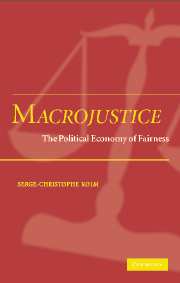Book contents
- Frontmatter
- Contents
- Presentation
- PART ONE BASES: CONSENSUS, FREEDOMS, AND CAPACITIES
- PART TWO OVERALL DISTRIBUTIVE JUSTICE: ELIE (EQUAL LABOUR INCOME EQUALIZATION)
- 7 Equal labour income equalization: General presentation
- 8 Models of labour and productivity
- 9 Equal duration income equalization
- 10 Information
- 11 Income justice
- 12 General equal labour income equalization: The model
- 13 Involuntary unemployment
- PART THREE COMPARISONS WITH POLICIES AND PHILOSOPHIES
- PART FOUR THE DEGREE OF COMMUNITY, EQUALITY, RECIPROCITY, AND SOLIDARITY
- PART FIVE COMPARISON WITH ECONOMICS' SOCIAL ETHICS
- References and bibliography
- Index
7 - Equal labour income equalization: General presentation
Published online by Cambridge University Press: 31 July 2009
- Frontmatter
- Contents
- Presentation
- PART ONE BASES: CONSENSUS, FREEDOMS, AND CAPACITIES
- PART TWO OVERALL DISTRIBUTIVE JUSTICE: ELIE (EQUAL LABOUR INCOME EQUALIZATION)
- 7 Equal labour income equalization: General presentation
- 8 Models of labour and productivity
- 9 Equal duration income equalization
- 10 Information
- 11 Income justice
- 12 General equal labour income equalization: The model
- 13 Involuntary unemployment
- PART THREE COMPARISONS WITH POLICIES AND PHILOSOPHIES
- PART FOUR THE DEGREE OF COMMUNITY, EQUALITY, RECIPROCITY, AND SOLIDARITY
- PART FIVE COMPARISON WITH ECONOMICS' SOCIAL ETHICS
- References and bibliography
- Index
Summary
Introduction
This chapter outlines the solution of the problem of macrojustice implied by the premises presented in Part I, the essentials of this derivation, and the general properties of this result. Further chapters present this solution, its reason, and its properties with formal models which are increasingly refined, notably as concerns the description of labour and of its yielding product and income. This leads to the successive consideration of constant wage rates, more general individual productivities, explicit modeling of all the characteristics of labour, and total or partial involuntary unemployment. Another chapter discusses the question of information for the implementation of the distributive policy, and Part III compares the obtained scheme with present policies, proposals of assistance schemes, and philosophers' and economists' conceptions.
The present chapter can thus be said to present “the philosophy” of the question – as common language uses this term. It uses no explicit formalization. Readers particularly familiar with formal models may prefer to begin by reading Chapters 9 or 11 (and 13 for the treatment of involuntary unemployment). Chapter 11 presents the most general case, but Chapter 9, which considers labour measurable as a quantity and fixed wage rates, permits an easy discussion of the main issues – actual cases can often be presented in this way for reasons and with adjustments that will be presented in Chapter 8.
The present chapter divides in two parts.
- Type
- Chapter
- Information
- MacrojusticeThe Political Economy of Fairness, pp. 111 - 134Publisher: Cambridge University PressPrint publication year: 2004



